Sylvia Gore - A football pioneer in England and Wales
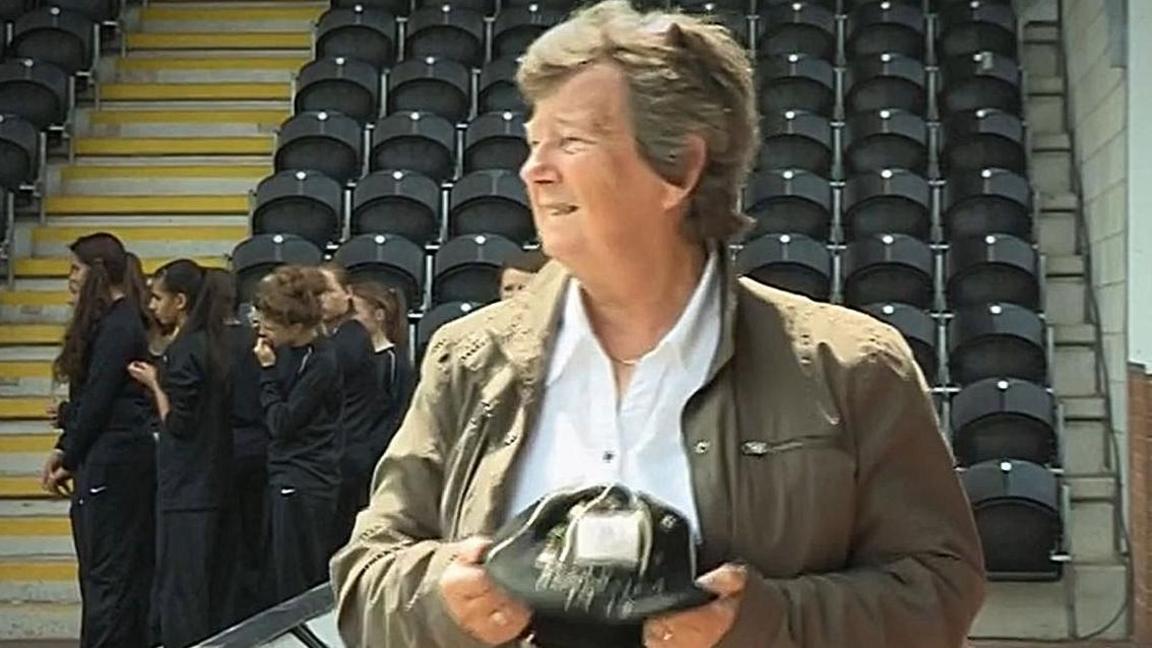
Sylvia Gore, pictured in 2013, with one of her England caps
- Published
If she were still alive, Sylvia Gore would no doubt have looked on proudly when England and Wales face each other at Euro 2025.
Involved in football for over 60 years, Gore has been described as a pioneer and a champion of the game and referred to as the 'Denis Law of women's football'.
Gore scored the first official goal for England 's women's side in 1972, who were a far cry from the current Lionesses, the reigning European champions and World Cup runners-up.
But Gore also made a significant contribution to the development of the women's game in Wales, managing the national side for over 10 years.
Football was a big part of Gore's life from an early age.
Born in Prescot on Merseyside, Gore remembered how she began kicking a ball as a three-year-old and on starting school would practise with the boys, but was not allowed to play in games.
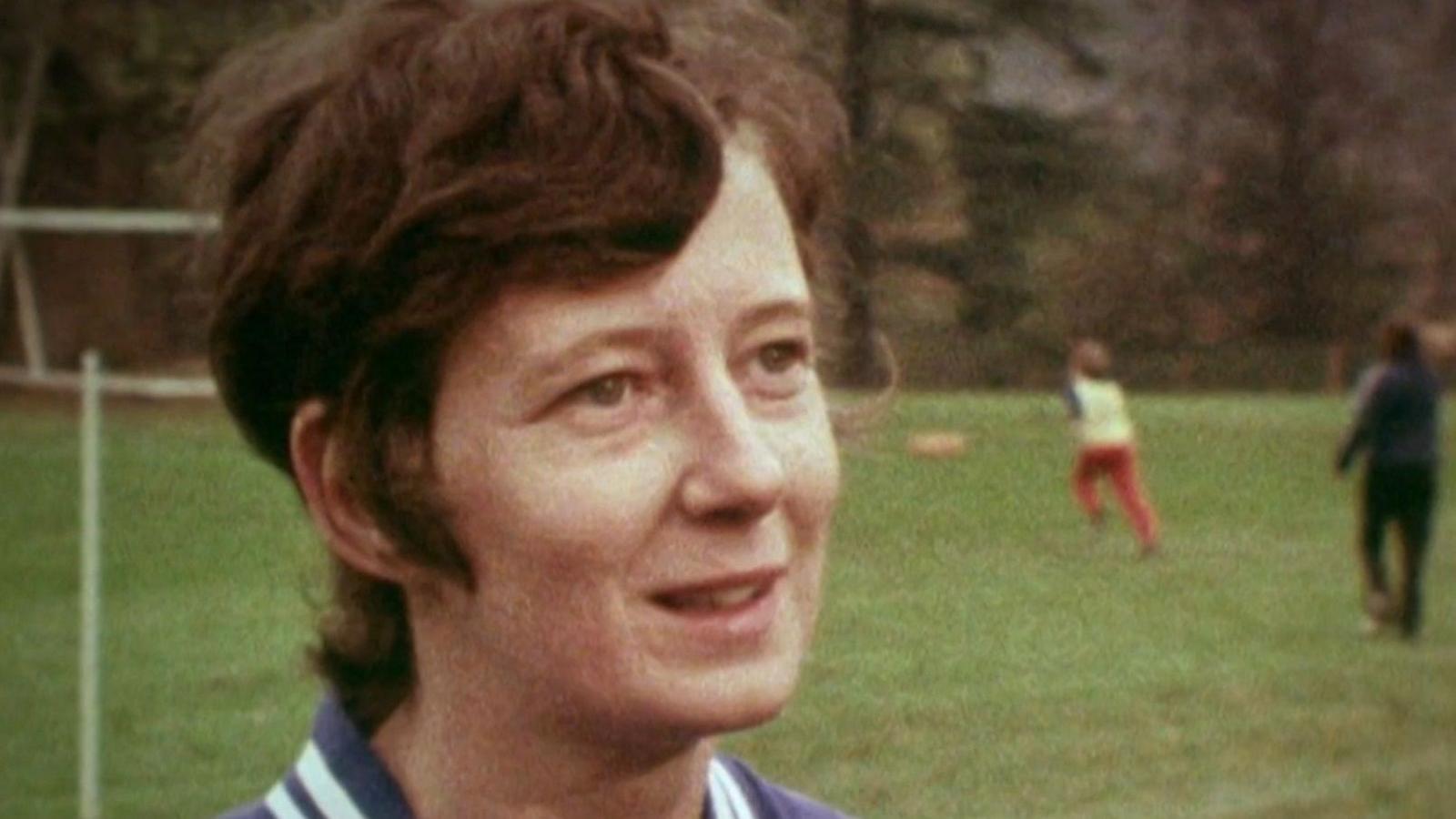
Sylvia Gore pictured during her playing career in the early 1970s
She started playing for Manchester Corinthians aged 12 in the late 1950s, travelling overseas, where the team played in front of big crowds.
She played at the time when the women's game was prohibited by the Football Association, with a ban in place since 1921.
The Football Association (FA) reasoning was that football was "quite unsuitable for females" and should "not be encouraged".
The FA lifted its 50-year ban in 1971 and a year later the first official England women's side would play their first game.
"There were over 500 players that came to trials and it was whittled down to 25 in the end," Gore recalled in a 2015 interview for the BBC's Sporting Witness.
"I think I went to four trials and it was a tremendous feeling to get a letter to say you were in the England squad after all those trials."
England's first match against Scotland in November 1972 – 100 years since the first men's international between the countries – was played at Greenock's Ravenscraig Stadium.
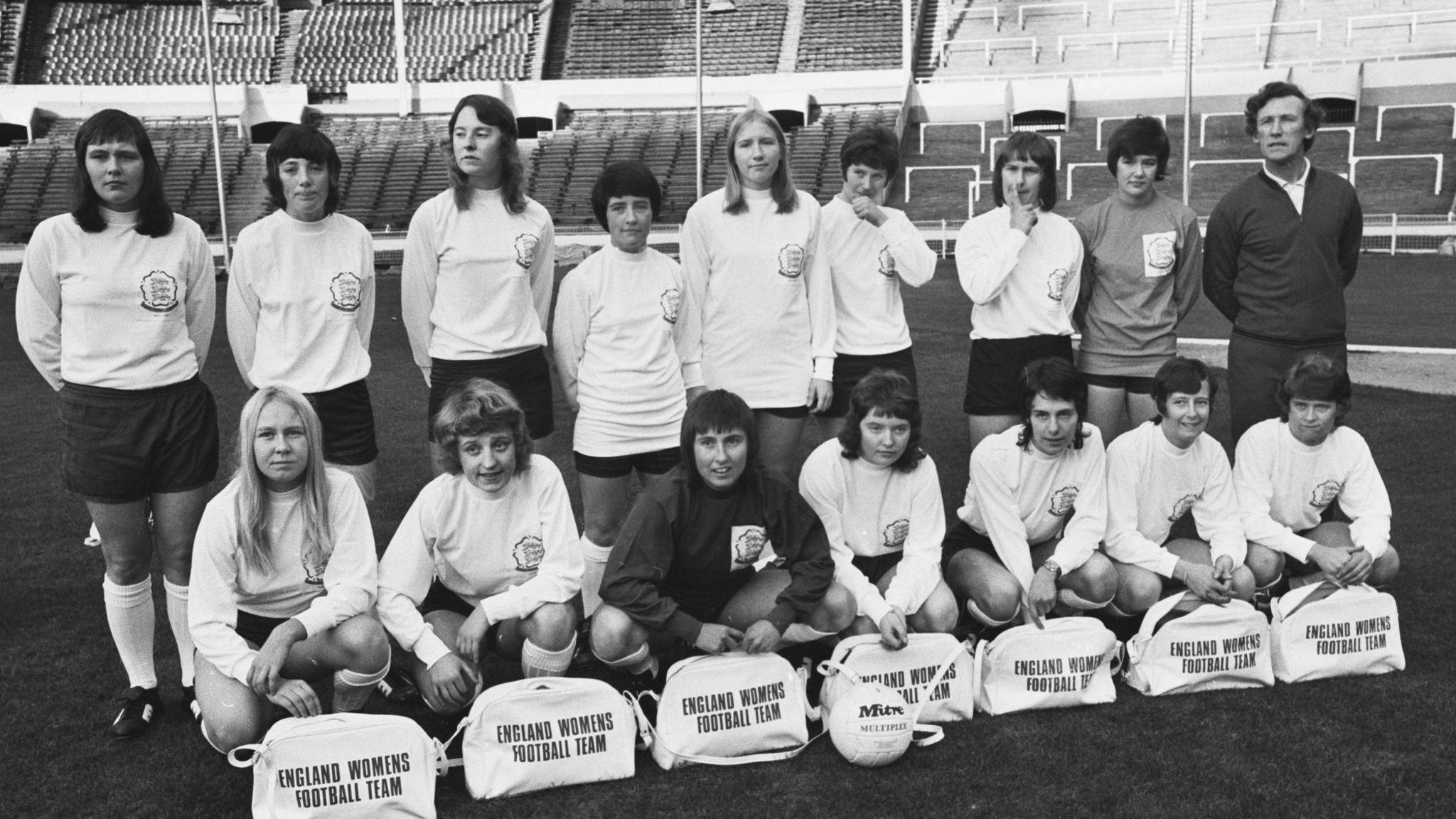
Sylvia Gore (front row, second from right) pictured with the England women's squad and their coach Eric Worthington at Wembley Stadium in 1972, before their game against Scotland
"The crowd was about 400-500 if I remember rightly, which we thought was a good crowd then," Gore said.
"The conditions were terrible. It was hard ground – frosty, icy.
"[It] shouldn't have gone ahead but obviously because we had travelled so far and the Scots wanted to play it... We wanted to play it because it was the first official international for the FA.
"We were two goals down at half-time and we had to step up a gear."
Step up a gear they did and Gore went on an individual run which saw her cut through Scotland's defence before coolly slotting home to score England's first official goal.
"I was delighted, I was jumping in the air and everyone was diving on me," Gore said.
It was the start of a comeback which saw England win 3-2 but significantly it was the start of a new era for women's football in the British Isles.
Who needs what to qualify for Euro 2025 knockouts?
- Published12 July
Gore once scored 134 goals in one season and played for renowned works team Fodens Ladies as well as north Wales-based Prestatyn, a side formed by sisters Mai and Eleri Griffith.
"I actually played against Sylvia when she played for England in about 1974 in Slough," recalls Michele Ward, who played in Wales' first unofficial international in 1973.
"We got beaten but what I do remember, it was sponsored by an egg company and at the end of games we would get presents from the other team.
"It was a plastic container with the English FA crest on it full of bath salts and half a dozen eggs."
After retiring from playing at the age of 36 due to injury, Gore embarked on a coaching career, with Prescot Ladies - a team she founded - and then as Wales national team manager.
"One of the main volunteers at the item was Ida Driscoll and how she got hold of Sylvia I don't really know to be honest," Michele Adams said.
"Whether people in north Wales put her in touch, quite possibly.
"She took the burden on at its weakest because up until then they had this little committee with people from Newport and Port Talbot."
Together Stronger: Euro 2025
Wales Women's International Football, who ran the national team and was chaired by Ida Driscoll, turned to the woman who seven years earlier scored England's first goal in an international.
Gore insisted that being a non-Welsh manager was not a big deal, pointing out that the manager of the senior Wales men's team at the time, Mike Smith, was also English and "not doing too bad a job".
"I've said it's impossible to expect miracles," she said at the time of her appointment in February 1979.
"But it's a challenge. It's an opportunity and I am going to make something of it.
"I wouldn't have missed this chance for the world. It's something I've always wanted and I will do my utmost to make it work."
Her first training session with Wales' 18-strong squad was on the morning of her first game in charge, against France in Bordeaux, following a 24-hour overland journey.
Wales lost 6-0 in France and a 7-0 defeat later that year against hosts Italy - a semi-professional side - in the Women's World Invitational Tournament was a stark reminder of how much catching up there was to do.
Gore had been appointed by Wales on an initial 12-month basis, but she would remain in charge for over 10 years and her enthusiasm for the role - despite a lack of resources - remained steadfast.
"It's hard work but I enjoy every minute of it," Gore told the Liverpool Echo in 1989.
"Unfortunately we haven't enough clubs in Wales to form a proper association, which might help to attract sponsors, so we have to pay all our own expenses."
Players not only had to pay their travelling expenses, they even had to pay for their own caps.
Gore would also make substantial financial contributions from her own pocket.
"When Sylvia came in we used to train one weekend in north Wales and the following weekend down in south Wales," Adams added.
"That would happen quite regularly over a six-week period.
"If we had an international away somewhere we were billeted in people's houses, not hotels."
Wales had faced the Republic of Ireland at Llanelli's Stebonheath Park in their first game in 1973 but were not affiliated with the Football Association of Wales at the time.
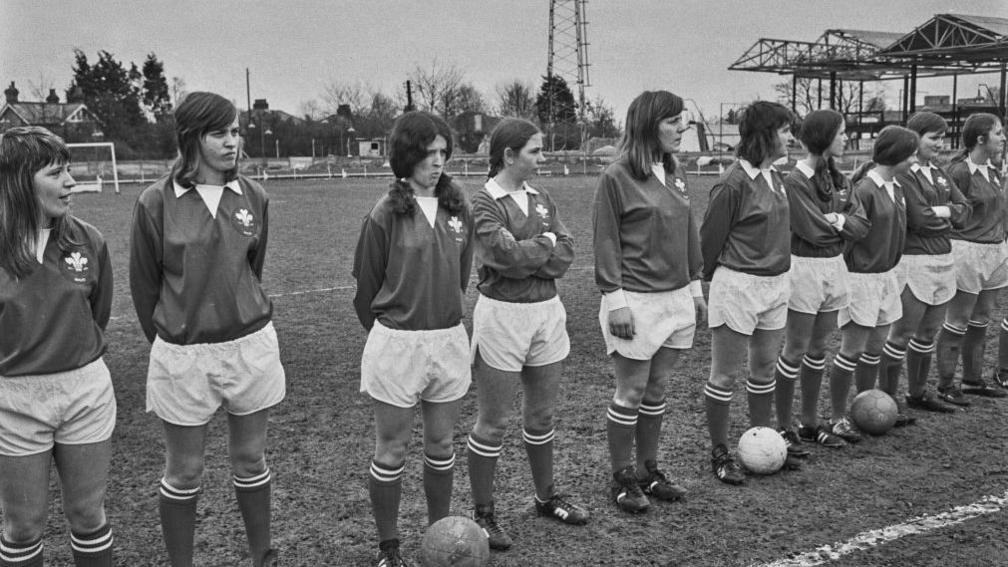
The Wales team line up before their game against England at Slough Stadium in March 1974, in which Michele Adams played against Sylvia Gore
Numerous attempts had been made in the preceding decades to get recognition, which had met with firm opposition and downright hostility from some Football Association of Wales (FAW) councillors.
"We have to remember that neither the Welsh or English FA were particularly organised in running women's football until much, much later," said The Guardian's women's football writer Tom Garry.
"Particularly in the 70s and 80s and into the early 90s, running women's football was a bit akin to how you might imagine a local sports community club is run in towns and villages across the country.
"Many people who spent time with Sylvia have always described how there was this sort of desire to help other teams develop.
"Knowledge-sharing was very common in those days, clubs wanting to help each other out and local FAs and local football groups wanting to help each other out. Sylvia epitomised that really, because a lot of different clubs benefited from the knowledge that she was able to share."
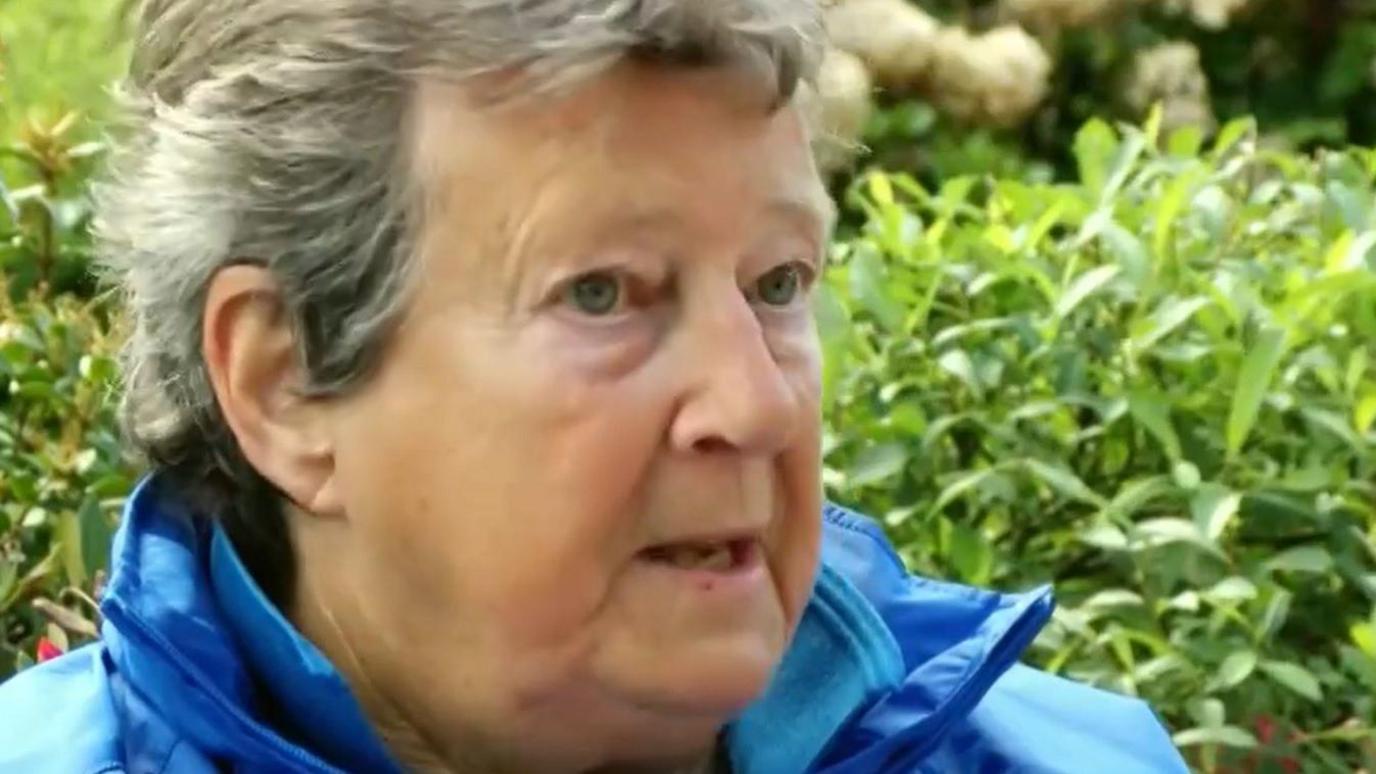
Sylvia Gore was appointed by Manchester City Women as their club ambassador to mark International Women's Day in 2016, a few months before she passed away
As Wales manager, Gore - who also coached Deeside Ladies in north Wales - essentially had a pool of less than 30 players to choose from, significantly fewer than England.
She attempted to expand Wales' squad by identifying players with Welsh family backgrounds, sending letters to women's leagues throughout the UK enquiring about eligible players.
"We started getting players in with Welsh heritage, about three or four players from England like Ann Rice and Gaynor Jones," Adams remembers.
"We had quite a few like that who came in."
At a time when women's football was reliant on the goodwill of volunteers and sponsors, Gore did much to raise standards.
"There was an appreciation of the professionalism that she brought to what was actually a very unprofessional job," Garry added.
"Sylvia was someone who knew what they were doing and had the best intentions of a team at heart, even if there perhaps wasn't the resource for them to go and be competitive on the wider international stage."
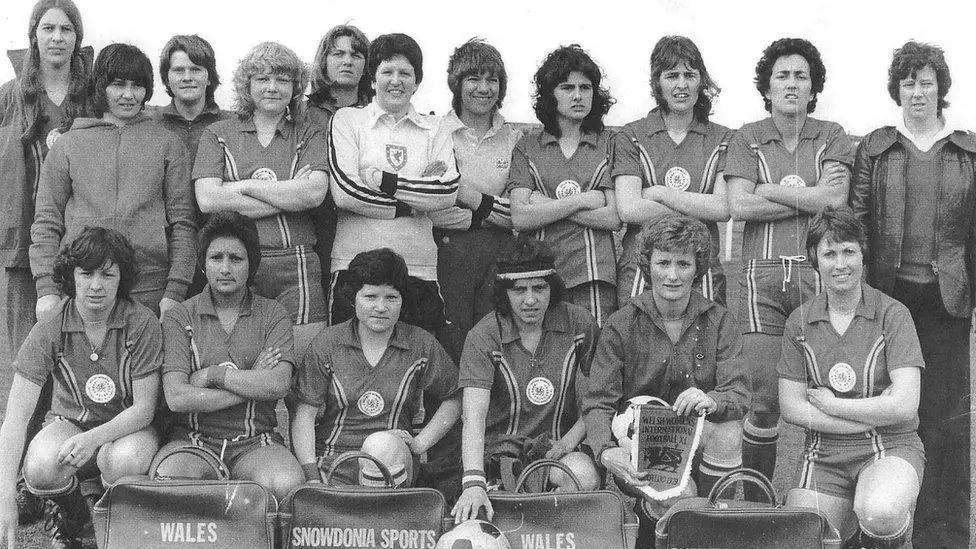
Sylvia Gore (back row on the right) with the Wales team that faced Scotland in Dundee in April 1979. The photograph is from former Wales international Mai Griffith's collection
But there were signs of change.
Gore was encouraged that FAW official Malcolm Stammers attended an international against England at Prescot Cables in April 1989 and presented the squad with a new kit.
"The big thing was to get over to the public at large that women really can play football and it is not just one big joke," Gore said after the game, which would be her last international in charge.
The FAW eventually took the women's team under their control in 1993 after being approached by Adams along with fellow internationals Laura McAllister and Karen Jones.
A team was entered into Uefa qualifying for the first time two years later.
Fast forward 30 years and the current team's appearance at Euro 2025 is Wales' first experience of playing at a major tournament.
As for Gore, her involvement with football continued after her stint managing Wales.
She was assistant manager at Knowsley United, and acted as secretary to Liverpool FC Ladies and as a member of the FA Women's Committee.
Sue Smith and Rachel Brown-Finnis, the former England internationals, have spoken of their gratitude to Gore and the influence she had on their early careers.
In 2000 she was awarded an MBE for services to girls and women's association football and she was inducted into the National Football Museum Hall of Fame a year later.
"Sylvia sat on various FA committees and through my club so did I," said Adams, chairwoman of FA Women's National League South side Gwalia United, who were previously known as Cardiff City Ladies, for whom she played and managed.
"We used to meet up quite often - two or three times a year - at these meetings and she always came bounding over towards us.
"She liked the involvement with the Welsh. She was a good soul and did an awful lot for the women's game."
Gore died aged 71 in 2016 having made a remarkable contribution to the story of women's football.
"She had been through and experienced so many of the important moments in the sport, not just playing and scoring in that first England fixture," added Garry.
"I think to essentially dedicate your life to trying to grow the game is almost an even stronger legacy than the sheer volume of goals that she scored for Manchester Corinthians, Foden's and England.
"Undoubtedly that helped both England and Wales get to a place where they are now, where these two teams are in this tournament."